The Basque separatist group Eta is expected on Friday to take a historic step towards handing over weapons and bomb-making equipment used in its terror campaign for independence that has claimed more than 800 victims over decades.
Sources in the northern Basque region of Spain and elsewhere said mediators would declare that Eta had already made significant moves in readying itself for giving up or disabling weapons and was ready to go further.
Details remained scarce, however, and analysts were fearful that Eta could try to drag the process out while seeking concessions from Mariano Rajoy, the Spanish prime minister.
Rajoy's conservative government has refused to negotiate, demanding that Eta admits defeat and surrenders unconditionally.
Former Eta members told the Guardian that most of the group's arms were hidden in France, where historically it has had its command and logistics base. Eta stole 400 pistols from an arms depot in Vauvert, France, eight years ago and media reports in Spain suggest members could make public the geographical co-ordinates of several secret arms dumps where these explosives are stored.
The group is also known to have had SA-7 ground-to-air missiles in the past.
The move comes more than two years after Eta first indicated it was abandoning a 40-year campaign of violence against targets in Spain, by announcing a unilateral, permanent ceasefire.
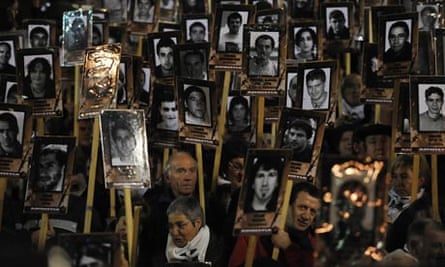
While the contents of Friday's announcement remained secret, sources close to the organisation said the move represented significant change with Eta and its backers committing to politics rather than violence in their pursuit of an independent Basque state composed of four Spanish provinces and part of south-west France.
The disarmament moves have the support of the Basque regional prime minister, Iñigo Urkullu, and his moderate Basque Nationalist party (PNV, or Partido Nacionalista Vasco).
"The sooner they do this, the better," said Josu Erkoreka, a spokesman for the Basque government, which also called for more than a symbolic gesture by Eta.
The government of Rajoy, whose party is the centre-right People's party (PP, or Partido Popular), has arrested dozens of suspected Eta members since the ceasefire. It refuses to discuss reciprocal measures to improve the conditions of 530 Eta prisoners.
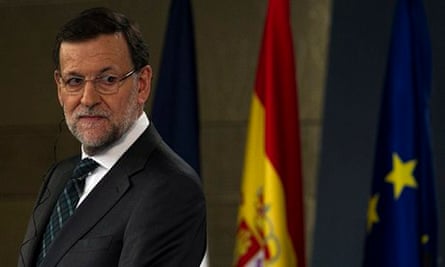
Antonio Troitiño, a suspected member of Eta, was detained in London a week ago, and two former Eta members, accused of a dozen killings in the 1990s, were this week extradited from Mexico.
"The time for theatre is over," said Jorge Fernández Díaz, Spain's interior minister, who added that the government welcomed disarmament but warned Eta would make as much political capital as it could out of it in order to remain a player in the Basque region.
Rajoy and Urkullu met secretly in Madrid this month; there has been no official confirmation of the content of their conversation, which was assumed to be about Eta and the disarmament.
The move comes as Rajoy faces a new rightwing party, Vox, which accuses him of going soft on Eta by obeying a European court of human rights order which has led to 50 of the group's most veteran prisoners being released from jail in recent months.
Vox members will stand at European elections in May, when the party will be the only serious contender to the right of the PP.
One of its leaders is José Antonio Ortega Lara, a former prison officer who was kidnapped and held captive by Eta for 532 days.
On 8 February the Eta leadership published a communique confirming that it would soon make "significant contributions" towards peace.
The Eta leaders David Pla and Iratxe Sorzabal were given refuge in Norway during the early period of the ceasefire, but were expelled after no headway was made in the peace process. Their whereabouts is currently unknown.
Disarmament will increase calls from the Basque country for Eta prisoners to be moved to jails close to their families.
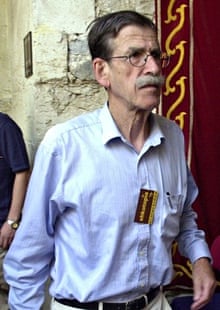
Julen Madariaga, 81, one of Eta's founder members, said the group and its supporters were now firmly committed to peace, but called on members to avoid the humiliation of handing over arms directly to Spanish authorities.
"Psychologically that would be important to our people," said Madariaga, who broke away from the group almost 20 years ago.
"I am glad that Eta has changed," he added. "Already in the 1990s it was obvious that it was driving people away from the separatist cause."
For Rosa Rodero, whose police officer husband, Joseba Goikoetxea, was killed by an Eta gunman in front of his teenage son after stopping his car at a traffic light, disarmament is a key step towards ensuring her grandchildren can live in a Basque country at peace. "I, my parents and my children, have all had to suffer because of this," she said. "Now I have grandchildren and I am hopeful. We can't do anything for those who have gone, but we can for those who remain in order to give them peace and tranquillity."
Some analysts were sceptical about Eta's intentions, however, claiming the organisation was trying to turn defeat into a propaganda victory.
"They are making a virtue out of necessity," said Rogelio Alonso, a lecturer at King Juan Carlos University in Madrid, who worries that too many Basque separatists still feel that Eta's violance was legitimate.
"It seems unlikely Eta will ever kill again, but there has to be more than that. Killing, kidnapping and bombings are just part of the problem. The legitimacy of violence is another part."
Concerns that a breakaway group of hardline radicals might keep up the terror campaign have so far proved baseless.
"The amazing thing is that those people in Basque villages and neighbourhoods who once backed the group have changed their attitudes so quickly. No one has called for Eta to pick up arms again – quite the opposite," said Gorka Espiau of the University of the Basque Country's Agirre Centre in Bilbao.
Espiau worries, however, that politicians remain stuck in the old habits of confrontation and that people have not learned the lessons of Northern Ireland or South Africa.
"New leaders and new ideas are required," he said. "Gerry Adams said that leaders themselves have to change internally."
Separatist tension in Spain has shifted from the Basque country to Catalonia in recent years, with the previously moderate regional president, Artur Mas, now demanding a Scottish-style referendum. Rajoy has refused to give permission.
Urkullu is believed to want to finesse the end of Eta before turning to the question of Basque sovereignty. His semi-autonomous government already runs everything from education and health to policing and the courts, and has a far better financing deal with Madrid than does Catalonia.
But he is under pressure from Sortu, an independence party led by former members of Eta's front party, Batasuna.
Sortu would win 26% of Basque votes, according to recent polling, while the PNV – which is split between a more separatist wing and those happy with the current self-government arrangement – would obtain 35%.
"What we have seen in Catalonia is the moderates pushed towards more radical positions by the outright separatists," said Alonso. "The same thing could happen in the Basque country."
Eta was formed at the end of the 1950s by young Basque nationalists who wanted to fight General Franco's dictatorship, though members did not attack the police or armed forces until 1968.
Franco responded by imposing a state of emergency in parts of the Basque country, helping boost support for Eta as it assassinated, among others, his heir apparent, Admiral Luis Carrero Blanco.
An amnesty after Franco's death in 1975 did not put an end to the group, which had its bloodiest year in 1980, killing almost 100 people at a time when Spain was still finding its way as a young democracy.
But Spain's security services, who backed a dirty war carried out by mercenaries, slowly strangled Eta's ability to carry out bomb and pistol attacks. Popular support dwindled and in its last decade of violence no more than five people were killed each year.
As disarmament looms, some former Eta members are no longer sure that their terror campaign achieved anything.
"I have met former Eta prisoners and people on the separatist left who are very sure that this is something definitive," said Rodero, who campaigns for reconciliation. "For them all these years of violence have been useless."
Years of terror
1958 Euskadi ta Askatasuna (Basque Homeland and Freedom) is formed with the aim to fight for Basque self-determination.
1968 Eta's first victim is police officer José Pardiñas.
1973 Eta kills the prime minister Luis Carrero Blanco by bombing his car.
1980 Nearly 100 people are killed in the terror group's bloodiest year.
June 1987 Eta issues an apology after a bomb planted by them in a Barcelona supermarket kills 21 shoppers.
September 1998 A truce is announced which lasts until December 1999.
March 2006 A permanent ceasefire is officially declared, but killings and bombings continue.
February 2010 Eta's top leader, Ibon Gogeascoechea, is arrested in Normandy, France.
January 2011 Eta declares a ceasefire. It is rejected by the Spanish government which demands a definitive commitment to end all violence.
Luc Torres
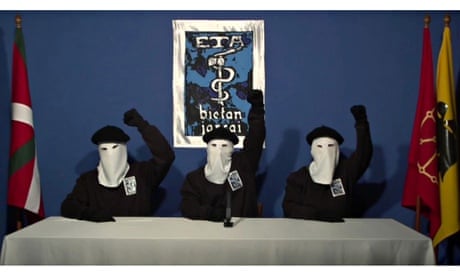


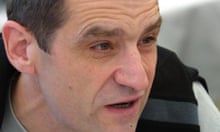
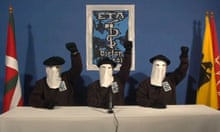
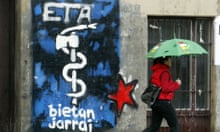

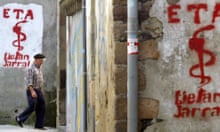
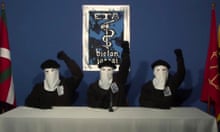
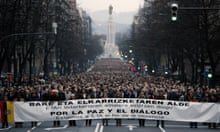
Comments (…)
Sign in or create your Guardian account to join the discussion